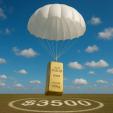Central banks should learn to live with low inflation: BIS
Vienna-Austria (Sept 14) - Central banks should learn tolive with inflation rates that persistently miss their targetsrather than fuel debt with increasingly aggressive stimuluspolicies, a top economist at the Bank for InternationalSettlements said on Wednesday.
Major central banks across the developed world have pushedinterest rates to zero or below and printed trillions of dollarsto stimulate their economies, driving bond yields to record lowsbut failing to significantly boost inflation.
Claudio Borio, head of the monetary and economic departmentat the BIS and a long-standing sceptic of ultra-easy policies,said central banks may need to give themselves more time toreach their inflation goals because their policies may threatenlong-term economic stability.
"It is quite possible that a financial stability-orientedmonetary policy may require greater tolerance for persistentdeviations of inflation from target," he told a central bankers'gathering in Vienna.
"Such a policy does not require changing mandates... but itmay require at least refinements in how the mandates are putinto practice, including the horizon for achieving inflationobjectives."
Despite printing over a trillion euros ($1.12 trillion) andadopting a range of measures to stimulate lending, the EuropeanCentral Bank has missed its target of almost 2 percent inflationfor over three years.
A wait-and-see attitude towards more stimulus is alsogaining traction inside the ECB, with board member SabineLautenschlaeger saying on Tuesday the bank should hold off onfresh moves and give earlier measures time to work.
Borio argued that, at a time when inflation is kept low byglobalisation and technological advances, continued stimulusrisks creating a situation in which debt is difficult orimpossible to repay, or "debt trap".
"A debt trap would threaten and make it hard to raiseinterest rates without causing damage to the economy," he said."The mix of balance sheet recessions and a stubborn disinflationprocess can be toxic."
He cautioned that he did not imply this reflected thecurrent situation, but argued the hypothesis warranted greaterattention.($1 = 0.8908 euros)
Source: Reuters










